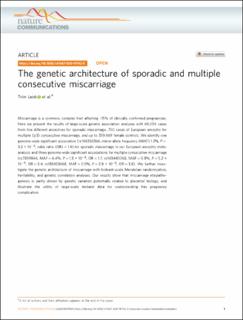The genetic architecture of sporadic and multiple consecutive miscarriage
Laisk, Triin; Soares, Ana Luiza G.; Ferreira, Teresa; Painter, Jodie N.; Censin, Jenny C.; Laber, Samantha; Bacelis, Jonas; Chen, Chia-Yen; Lepamets, Maarja; Lin, Kuang; Liu, Siyang; Millwood, Iona Y.; Ramu, Avinash; Southcombe, Jennifer; Andersen, Marianne S.; Yang, Ling; Becker, Christian M.; Børglum, Anders D.; Gordon, Scott D.; Bybjerg-Grauholm, Jonas; Helgeland, Øyvind; Hougaard, David M.; Jin, Xin; Johansson, Stefan; Juodakis, Julius; Kartsonaki, Christina; Kukushkina, Viktorija; Lind, Penelope A.; Metspalu, Andres; Montgomery, Grant W.; Morris, Andrew P.; Mors, Ole; Mortensen, Preben B.; Njølstad, Pål Rasmus; Nordentoft, Merete; Nyholt, Dale R.; Lippincott, Margaret; Seminara, Stephanie; Salumets, Andres; Snieder, Harold; Zondervan, Krina; Werge, Thomas; Chen, Zhengming; Conrad, Donald F.; Jacobsson, Bo; Li, Liming; Martin, Nicholas G.; Neale, Benjamin M.; Nielsen, Rasmus; Walters, Robin G.
Journal article, Peer reviewed
Published version

Åpne
Permanent lenke
https://hdl.handle.net/11250/2763819Utgivelsesdato
2020Metadata
Vis full innførselSamlinger
- Department of Clinical Science [2318]
- Registrations from Cristin [9791]
Sammendrag
Miscarriage is a common, complex trait affecting ~15% of clinically confirmed pregnancies. Here we present the results of large-scale genetic association analyses with 69,054 cases from five different ancestries for sporadic miscarriage, 750 cases of European ancestry for multiple (≥3) consecutive miscarriage, and up to 359,469 female controls. We identify one genome-wide significant association (rs146350366, minor allele frequency (MAF) 1.2%, P = 3.2 × 10−8, odds ratio (OR) = 1.4) for sporadic miscarriage in our European ancestry meta-analysis and three genome-wide significant associations for multiple consecutive miscarriage (rs7859844, MAF = 6.4%, P = 1.3 × 10−8, OR = 1.7; rs143445068, MAF = 0.8%, P = 5.2 × 10−9, OR = 3.4; rs183453668, MAF = 0.5%, P = 2.8 × 10−8, OR = 3.8). We further investigate the genetic architecture of miscarriage with biobank-scale Mendelian randomization, heritability, and genetic correlation analyses. Our results show that miscarriage etiopathogenesis is partly driven by genetic variation potentially related to placental biology, and illustrate the utility of large-scale biobank data for understanding this pregnancy complication.
